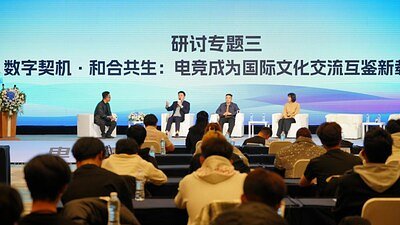
China Levels Up: Esports as a Tool for Soft Power and Tech Innovation
Beijing is doubling down on esports, hosting major tournaments and investing heavily in the industry. Is this a genuine push for innovation, or a strategic play to enhance China’s global influence and connect with a new generation?
China Levels Up: Esports as a Tool for Soft Power and Tech Innovation
MUDANJIAN, CHINA – November 18, 2025 – China’s ambition to become a global leader in esports extended beyond hosting major international tournaments this month, as the 2025 Esports Innovation and Communication Seminar concluded in Mudanjiang. The event, hosted by CCTV Animation Group with support from the China Media Group (CMG) National Institute for Esports Development, signaled a concerted effort to cultivate both the competitive scene and the underlying technological advancements driving the industry, while simultaneously projecting a modern, digitally-savvy image to the world.
A State-Backed Push for Esports Dominance
China's involvement in esports is no longer simply about recognizing the popularity of gaming. The country is actively investing in the sector, viewing it as a key component of its broader economic and cultural strategy. CCTV Animation Group’s hosting of the seminar, backed by the CMG National Institute for Esports Development, represents a significant escalation in this commitment. The institute, launched in July 2024, aims to bolster industry cooperation, foster international exchange, and explore new cultural connections through esports.
“The level of state support is unprecedented,” noted an industry analyst familiar with the Chinese esports landscape. “This isn’t just about letting the market develop organically; it’s a deliberate strategy to position China at the forefront of a global industry.” This commitment is underscored by strategic partnerships forged by CMG with key international esports entities, including the Esports World Cup Foundation and VSPO. These collaborations aim to co-organize events, expand market reach, and promote event content, both domestically and abroad.
China’s long-standing recognition of esports as an official sport since 2003 has laid the groundwork for this current surge in investment. The country has already established itself as a major host of large-scale international tournaments, including League of Legends Worlds, Honor of Kings, and CS2 events. However, the recent initiatives demonstrate a move beyond simply attracting events to actively shaping the future of the industry.
Capturing the Next Generation
The seminar’s focus on Gen Z and esports culture highlights China’s understanding of the demographic driving growth in the sector. This generation, often referred to as digital natives, is heavily engaged with esports, both as players and viewers. China is keenly aware of this trend and is tailoring its esports offerings to appeal to this crucial demographic.
“Understanding the preferences of Gen Z is paramount,” explained a marketing consultant specializing in esports. “They’re looking for authentic experiences, engaging content, and a sense of community. China is investing heavily in creating those types of environments.” This includes promoting local esports talent, developing mobile esports platforms, and fostering a vibrant esports ecosystem that caters to the specific tastes of Chinese Gen Z consumers.
The appeal of esports to this demographic extends beyond entertainment. It offers opportunities for social interaction, skill development, and even potential career paths. China recognizes this and is actively promoting esports as a viable and attractive option for young people.
AI and the Future of Competitive Gaming
The seminar's emphasis on AI and technological innovation underscores China’s ambition to not only compete in the esports arena but to lead the development of the technologies that will shape its future. The country is investing heavily in areas such as AI-powered game analysis, virtual reality training platforms, and advanced streaming technologies.
“AI is transforming every aspect of esports,” said a technology developer specializing in gaming applications. “From improving player performance to enhancing the viewing experience, the possibilities are endless.” China is positioning itself to be at the forefront of this revolution, with a focus on developing cutting-edge technologies that can give its esports players a competitive edge.
This includes exploring the use of AI-powered coaching tools, analyzing player data to identify weaknesses and strengths, and developing personalized training programs. Furthermore, China is investing in technologies that can enhance the viewing experience for fans, such as AI-powered commentary and personalized streaming feeds.
The development of VR/AR platforms for esports training also represents a significant area of investment. These platforms allow players to practice in immersive environments, simulating real-game scenarios and improving their skills in a safe and controlled setting.
One analyst noted, “China sees technological leadership in esports as a way to demonstrate its broader innovation capabilities and attract talent from around the world.” This strategic focus on technology is not only driving the development of new esports products and services but also contributing to the country’s overall economic growth.
